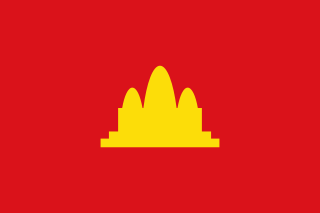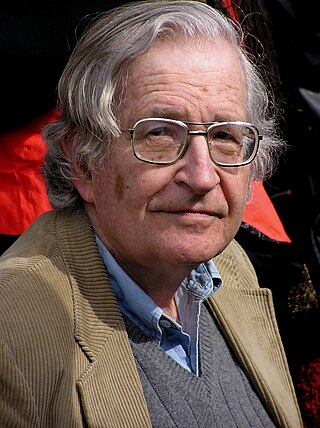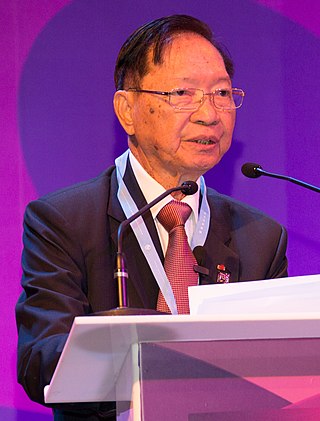The history of Cambodia, a country in mainland Southeast Asia, can be traced back to Indian civilization. Detailed records of a political structure on the territory of what is now Cambodia first appear in Chinese annals in reference to Funan, a polity that encompassed the southernmost part of the Indochinese peninsula during the 1st to 6th centuries. Centered at the lower Mekong, Funan is noted as the oldest regional Hindu culture, which suggests prolonged socio-economic interaction with maritime trading partners of the Indosphere in the west. By the 6th century a civilization, called Chenla or Zhenla in Chinese annals, firmly replaced Funan, as it controlled larger, more undulating areas of Indochina and maintained more than a singular centre of power.
Isolationism is a term used to refer to a political philosophy advocating a national foreign policy that opposes involvement in the political affairs, and especially the wars, of other countries. Thus, isolationism fundamentally advocates neutrality and opposes entanglement in military alliances and mutual defense pacts. In its purest form, isolationism opposes all commitments to foreign countries including treaties and trade agreements. This distinguishes isolationism from non-interventionism, which also advocates military neutrality but does not necessarily oppose international commitments and treaties in general.

The Khmer Rouge is the name that was popularly given to members of the Communist Party of Kampuchea (CPK) and by extension to the regime through which the CPK ruled Cambodia between 1975 and 1979. The name was coined in the 1960s by then Chief of State Norodom Sihanouk to describe his country's heterogeneous, communist-led dissidents, with whom he allied after his 1970 overthrow.

Cambodia, officially the Kingdom of Cambodia, is a country in Mainland Southeast Asia, spanning an area of 181,035 square kilometres, bordered by Thailand to the northwest, Laos to the north, Vietnam to the east, and the Gulf of Thailand to the southwest. The capital and most populous city is Phnom Penh.

After the fall of the Pol Pot regime of Democratic Kampuchea, Cambodia was under Vietnamese occupation and a pro-Hanoi government, the People's Republic of Kampuchea, was established. A civil war raged during the 1980s opposing the government's Kampuchean People's Revolutionary Armed Forces against the Coalition Government of Democratic Kampuchea, a government in exile composed of three Cambodian political factions: Prince Norodom Sihanouk's FUNCINPEC party, the Party of Democratic Kampuchea and the Khmer People's National Liberation Front (KPNLF).

The Kingdom of Cambodia, also known as the First Kingdom of Cambodia, and commonly referred to as the Sangkum period, refers to Norodom Sihanouk's first administration of Cambodia from 1953 to 1970, an especially significant time in the country's history. Sihanouk continues to be one of the most controversial figures in Southeast Asia's turbulent and often tragic postwar history. From 1955 until 1970, Sihanouk's Sangkum was the sole legal party in Cambodia.

Kriangsak Chamanan served as prime minister of Thailand from 1977 to 1980. After staging a successful coup, he was asked to become Prime Minister in 1977. He ruled till 1980 and is credited with "steering Thailand to democracy" in a time where communist insurgents were rampant internally and neighbouring countries turned to communist rule following the communist takeover of Vietnam: South Vietnam, Laos, and Cambodia.
Edward Samuel Herman was an American economist, media scholar and social critic. Herman is known for his media criticism, in particular the propaganda model hypothesis he developed with Noam Chomsky, a frequent co-writer. He held an appointment as Professor Emeritus of finance at the Wharton School of Business of the University of Pennsylvania. He also taught at Annenberg School for Communication at the University of Pennsylvania.

The Cambodian–Vietnamese War was an armed conflict between Democratic Kampuchea, controlled by Pol Pot's Khmer Rouge, and the Socialist Republic of Vietnam. The war began with repeated attacks by the Liberation Army of Kampuchea on the southwestern border of Vietnam, particularly the Ba Chúc massacre which resulted in the deaths of over 3,000 Vietnamese civilians. On 23 December 1978, 10 out of 19 divisions of Khmer Rouge's military divisions opened fire along the shared Southwestern borderline with Vietnam with the goal of invading the Vietnamese provinces of Đồng Tháp, An Giang and Kiên Giang. On 25 December 1978, Vietnam launched a full-scale invasion of Kampuchea, and subsequently occupied the country and removed the government of the Communist Party of Kampuchea from power.

Noam Chomsky is an intellectual, political activist, and critic of the foreign policy of the United States and other governments. Noam Chomsky describes himself as an anarcho-syndicalist and libertarian socialist, and is considered to be a key intellectual figure within the left wing of politics of the United States.

Kampuchea, officially Democratic Kampuchea (DK) from 1976 onward, was the Cambodian state from 1975 to 1979, under the totalitarian dictatorship of Pol Pot and the Communist Party of Kampuchea (CPK), commonly known as the Khmer Rouge (KR). It was established following the Khmer Rouge's capture of the capital Phnom Penh, effectively ending the United States-backed Khmer Republic of Lon Nol. After Vietnam took Phnom Penh in 1979, it was disestablished in 1982 with the creation of the CGDK in its place.

The People's Republic of Kampuchea (PRK) was a partially recognised state in Southeast Asia which existed from 1979 to 1989. It was a client state of Vietnam, founded in Cambodia by the Vietnamese-backed Kampuchean United Front for National Salvation, a group of Cambodian communists who were dissatisfied with the Khmer Rouge due to its oppressive rule and defected from it after the overthrow of Democratic Kampuchea, Pol Pot's government. Brought about by an invasion from Vietnam, which routed the Khmer Rouge armies, it had Vietnam and the Soviet Union as its main allies.

Cambodia was a farming area in the first and second millennia BC. States in the area engaged in trade in the Indian Ocean and exported rice surpluses. Complex irrigation systems were built in the 9th century. The French colonial period left the large feudal landholdings intact. Roads and a railway were built, and rubber, rice and corn grown. After independence Sihanouk pursued a policy of economic independence, securing aid and investment from a number of countries.

Keat Chhon is a Cambodian politician. He belongs to the Cambodian People's Party and was elected to represent Phnom Penh in the National Assembly of Cambodia in 2003. He was the Minister for Economy and Finance from 1994 to 2013. By 2018, he has retired from all public offices.

Kao Kim Hourn is the current Secretary-General of the Association of Southeast Asian Nations (ASEAN). He previously served two terms as Minister Delegate attached to the Prime Minister of the Kingdom of Cambodia (2013-2022) and two terms as Secretary of State of Cambodia's Ministry of Foreign Affairs and International Cooperation (2003-2013). Dr. Kao, his formal Cambodian name, is a Member of the Supreme National Economic Council, Senior Fellow at the Jeffrey Cheah Institute on Southeast Asia, and a Member of the Global Council of The Asia Society.

Cambodian genocide denial is the belief expressed by some Western academics that early claims of atrocities committed by the Khmer Rouge government (1975–1979) in Cambodia were much exaggerated. Many scholars of Cambodia and intellectuals opposed to the US involvement in the Vietnam War denied or minimized reports of human rights abuses of the Khmer Rouge, characterizing contrary reports as "tales told by refugees" and US propaganda. They viewed the assumption of power by the Communist Party of Kampuchea as a positive development for the people of Cambodia who had been severely impacted by the Vietnam War and the Cambodian Civil War. On the other side of the argument, anti-communists in the United States and elsewhere saw in the rule of the Khmer Rouge vindication of their belief that the victory of Communist governments in Southeast Asia would lead to a "bloodbath."

The Cambodian genocide was the systematic persecution and killing of Cambodian citizens by the Khmer Rouge under the leadership of Prime Minister of Democratic Kampuchea, Pol Pot. It resulted in the deaths of 1.5 to 2 million people from 1975 to 1979, nearly 25% of Cambodia's population in 1975.

The Political Economy of Human Rights is a 1979 two-volume work by Noam Chomsky and Edward S. Herman. The authors offer a critique of United States foreign policy, particularly in Indochina.
Ros Chantrabot is a Khmer novelist, poet, historian and member of the Royal Academy of Cambodia.
Ke Kim Yan is the former Commander-in-Chief of the Royal Armed Forces of Cambodia and currently one of the ten Deputy Prime Ministers of Cambodia. He is considered as a "highly professional officer with a realistic approach to the challenges before him".














